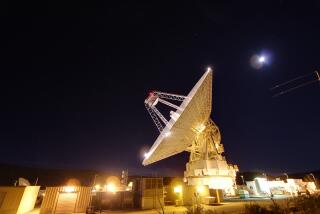Study Says NASA Charged Improperly by McDonnell
- Share via
WASHINGTON — The investigative arm of Congress concluded in a study released Friday that McDonnell Douglas Aerospace--a major contractor for the beleaguered space station--improperly charged the government for more than $300,000 in lobbying, advertising, consulting services and other costs, some of them in violation of federal law.
The study, conducted by the General Accounting Office and requested by Rep. John Conyers (D-Mich.), chairman of the House Committee on Government Operations, reviewed $3.6 million in 1989-92 overhead costs submitted by McDonnell Douglas’ Space Station Division in Huntington Beach and Houston.
The report is the first in a series of investigations requested by the committee in light of a “protracted history” of contract mismanagement at the National Aeronautics and Space Administration.
The Space Station Division was selected for review because nearly all of its sales were to NASA. The space station is one of NASA’s biggest and costliest endeavors, an orbiting laboratory that has itself been beset by delays in construction and a mounting number of critics who dismiss it as frivolous science.
“(This) illustrates the waste permitted by lax contract management and oversight,” Conyers said of the GAO report. He called for stronger oversight, noting that roughly 9% of the 1989-92 overhead costs billed by McDonnell Douglas--then the space station’s prime contractor--were “unallowable or inadequately supported.”
NASA spokesman Mark Hess said officials there had not yet seen the report and had no comment.
McDonnell Douglas officials said they never intended to improperly bill the government and would correct any error brought to their attention.
“We plan to work with NASA in correcting any problems we had in the accounting process,” said spokeswoman Anne Toulouse. “It certainly was not our intent to mischarge items on the space station.”
Among the $328,000 in inappropriate or unsubstantiated costs cited by the GAO were:
* $129,000 for lobbying Congress and executive branch officials, even though federal statutes and codes prohibit billing for such activity.
* $42,000 in a duplicate payment for advertising services.
* $69,000 for consulting services involving programs other than the space station.
* $77,000 in charges for consulting services that were not adequately documented.
“And although barred by statue and regulation, McDonnell Douglas even charged NASA about $7,000 in first-class air fare and more than $4,000 in registration fees at social and public relations events,” Conyers said.
The GAO report said that although other billing practices did not appear to violate federal regulations, they raised “serious questions” nevertheless, including:
* $53,000 to offset income taxes and social security taxes for employees who had received $1,000 incentive bonuses.
* $348,000 for reassignment payments offered by McDonnell Douglas as inducements for employees to accept transfers to other facilities.
* $1.9 million in employee educational expenses, which, although allowable, were considered excessive since they represented more than half of the $3.6 million in overhead that was charged.
About 90% of NASA’s $14-billion budget deals with contracts and acquisitions, Conyers said, suggesting that if so much waste was found by examining just $3.6 million, the window of vulnerability for more waste could be substantial.
Hearings will likely be held to review the GAO findings, officials said. Even if proved true, however, no penalty is likely to result.
“The way it works is, they just give the money back,” one congressional aide said.
The findings are yet another black mark against a space station that was unveiled with great fanfare by then-President Ronald Reagan as pioneering space exploration, but has been forced to go begging to Congress for money almost ever since.
With federal dollars scarce, lawmakers have slashed the budget year after year, causing construction delays and resulting in the loss of 1,500 jobs at the Huntington Beach facility--virtually half of the space station team there.
Prospects improved last month, however, when the House--which nearly killed the space station entirely last year--voted in June to fund $2.1 billion to keep the project alive.
More to Read
Inside the business of entertainment
The Wide Shot brings you news, analysis and insights on everything from streaming wars to production — and what it all means for the future.
You may occasionally receive promotional content from the Los Angeles Times.









